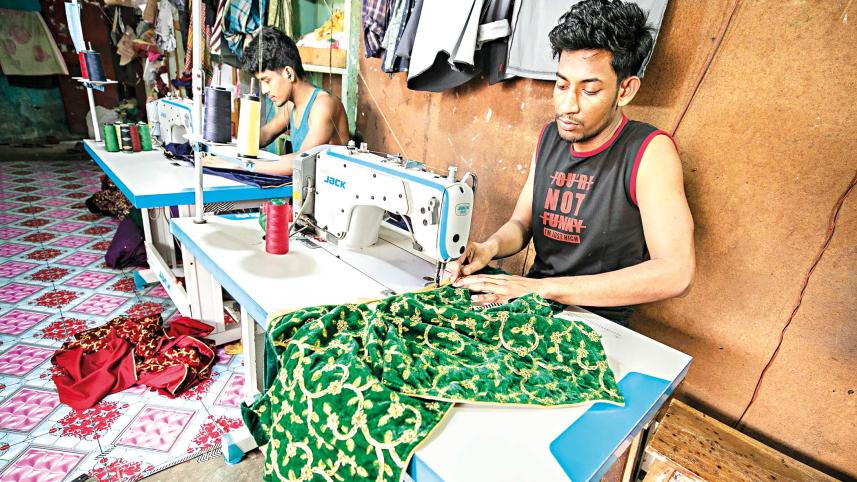Made in Khalifa Patti

The ringing sound of hundreds of sewing machines floats through Khalifa Patti in Chattogram every year before Eid-ul-Fitr. At least eight to ten people are hard at work round the clock in every shop of the market.
Almost six decades ago, this market was established at Ghatforhadbeg of the port city, where 3,000 employees are working at 400 shops at present.
Khalifa Patti is famous for making originally designed clothes as per customer's demand. The market's traders make all kinds of dresses after collecting clothes from Islampur in Dhaka and Teri Bazar area of the port city. Every trader here is well-versed in the latest fashion trends.

Visiting the spot, this correspondent saw that the shop staffers were displaying clothes to customers. Some workers were cutting clothes, some were sewing and others were busy pressing the clothes.
The shops also sell plain clothes and ready-made garments including three-piece, lehenga, skirt, saree, panjabi and children's clothes.
Employees said even though the market is busy throughout the year, the crowd multiplies before Eid.
Alam Hossain, owner of Noor Fashion, said, "We've been doing business here for three generations. We're constantly making new designs of clothes. At the same time, we follow designs that are in fashion."
Mohammad Russell, proprietor of Five Star Garments, said, "Clothing is made here for a minimum of Tk 150 and a maximum of Tk 10,000. These affordable prices are only possible since our artisans and workers are designers of the clothes."
"We can replicate almost any design with perfection," he prided.
Shahjahan, a worker of Samiya Fashion House, has been working there for 45 years. He said before 1980, the garment items made here were sold only in Chattogram's retail markets. But at present, Khalifa Patti's clothes have become popular all over the country.
Samsul Alam, general secretary of the Khalifa Patti Traders Welfare Association, said, "The market will be able to go into production on a larger scale if a separate zone was created. We'll be able to contribute more to the economy and increase employment."




 For all latest news, follow The Daily Star's Google News channel.
For all latest news, follow The Daily Star's Google News channel.
Comments